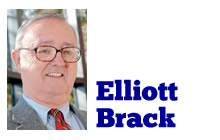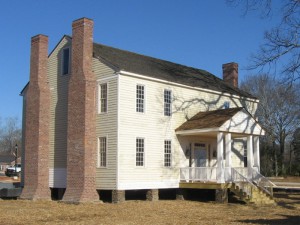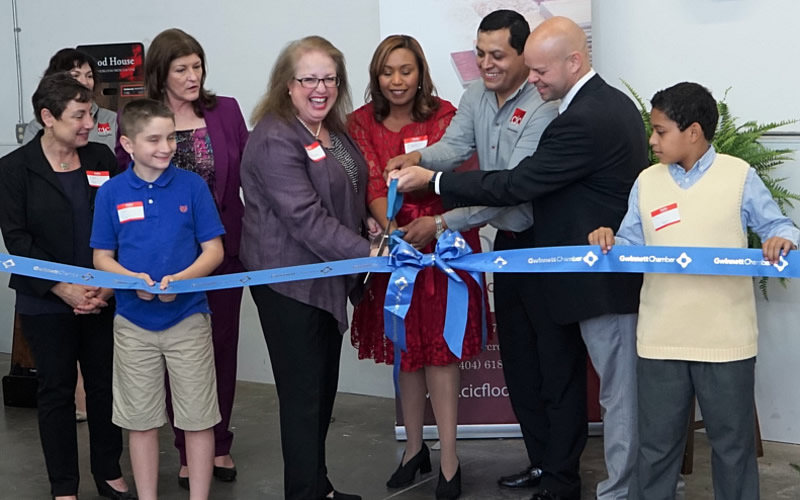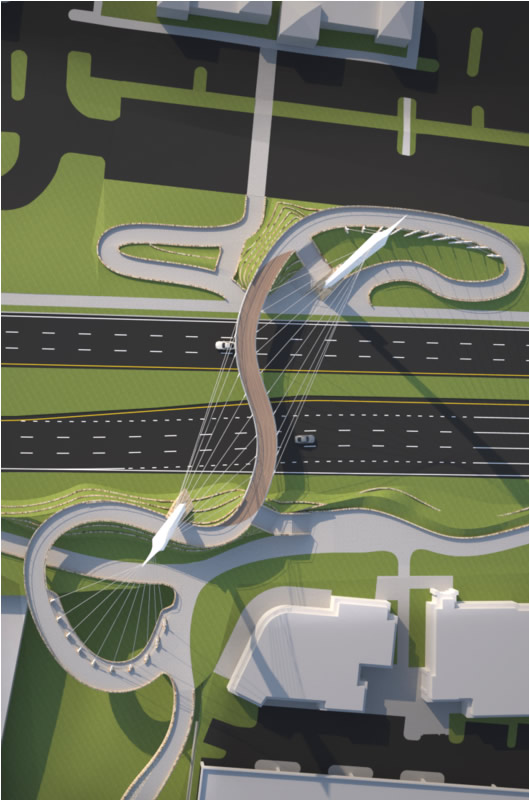IT WAS THE OPENING of a new showroom at CIC Floors of Norcross that brought these people together recently. From left are on the front row are Issac Olguin, County Commissioner Lynette Howard, Clara Olguin, Cesar Olguin, Victor Sanchez of Chick-Fil-A and Luke Roman. On the back row are Kimberly Coats, Ellen Williams and Sandy Richardson of the Gwinnett Chamber of Commerce. See Elliott Brack’s perspective for more on this story.
IN THIS EDITIONTODAY’S FOCUS: Peachtree Corners Bridge: From City-Lite to Big Government
EEB PERSPECTIVE: Immigrant Flooring Company Making Progress in Gwinnett
SPOTLIGHT: Renewal by Andersen of Atlanta
FEEDBACK: More Thoughts on North Carolina Legislation about Rest Rooms
UPCOMING: Hudgens Art Center To Hold Solo Exhibit by $50,000 Prize Winner
NOTABLE: Several Places Host Gwinnett for Early Voting through May 20
RECOMMENDED: My First Summer in the Sierra, by John Muir
GEORGIA TIDBIT: Congregation Mickve Israel of Savannah Oldest Jewish Temple in South
TODAY’S QUOTE: Former New Yorker Cartoonist Remembers His Other Careers
MYSTERY PHOTO: Lots of Metal Showing in This Mystery Photo
TODAY’S FOCUSPeachtree Corners’ bridge: From city-lite to big government
By Ali Stinson
PEACHTREE CORNERS, Ga., April 19, 2016 | It was barely four years ago when Mike Mason was the president of the United Peachtree Corners Civic Association on the campaign trail to sell us all on a new concept in local government that he branded “city-lite.”
As the story went, this was a brand new form of government: a city chartered for only three services – trash collection, code enforcement, and planning and zoning. He touted a financial study that said the whole thing could be run for $750,000. It was all very simple. He promised local control of whether and where apartments would be built and cheaper trash collection. That was the mission and the cost of the proposed city of Peachtree Corners a mere four years ago.
Here we are four years later. Mason is now Mayor. The city has a budget that is nearing $10 million debt and nearing $12 million with authorization for $15 million more, a cash slush-fund of $22 million, and a series of residential zoning approvals that include hundreds of new apartments. The city owns the property across from the Forum and gave the Methodist church $2 million to secure the purchase of the old Simpsonwood retreat. And now they are planning a monstrosity of a pedestrian bridge to span Georgia Highway 141 and connect the Forum to the strip mall across the street.
City employees give lofty presentations that this bridge will be an everlasting, iconic structure to rival the Eiffel Tower and Washington Monument. It will reflect Peachtree Corners mission to be “innovative and remarkable.” It will last the ages. It will bring businesses and jobs. It is a wonderful, magical bridge… that connects Sprouts to Belk over a busy four-lane highway.
Gone is all the talk of a small, un-ambitious, fiscally minuscule, little city government. No one utters the word city-lite anymore. No one refers to or remembers the city charter with its three little services. The talk of a $750,000 budget was abandoned before the last vote for the first city council was counted. The cost of this magical bridge between two shopping malls has yet to be disclosed. The city represents that it will be funded by a Special Purpose Local Option Sales Tax – SPLOST. They intimate that this funding mechanism somehow means it is free and that SPLOST is a permanent endless supply of dollars, rather than a tax that must be approved by tax-payer vote.
The idea of city-lite was a great sales pitch to convince a citizenry skeptical of politicians and sick to death of big government to vote it into existence. It turns out this was just marketing. After all, who wants to be mayor of a city known for cheap trash pickup and not much else. Now the city is to be “innovative and remarkable.” We should accept that a giant, meandering pedestrian bridge spanning a busy highway is some magical conduit to higher property values and better paying jobs.
So is this a bridge to some glorious future or just another tribute to government expansion and political ego? Is there any way to bring back city-lite and the lofty promise of something so small and unobtrusive? Or are we doomed to watch the government grow ever-larger and ever more deaf to the desires of the citizens that brought it into existence?
- A poll on the Bridge is available here: http://m.ajc.com/news/news/local/peachtree-corners-bridge-designs-bring-out-divided/nq2mr/ Send a message by choosing “No Bridge.”
Immigrant flooring business opens new showroom in Norcross
By Elliott Brack, editor and publisher
APRIL 19, 2016 | It’s always good to see a Gwinnett business succeeding. It’s particularly a good feeling when it is an immigrant business in diverse Gwinnett.
 We recently attended the opening of CIC Floors showroom in Norcross. It’s located behind The Varsity (its address is 1756 Wilwat Drive). We felt elated to watch the family happily cut the ribbon on the business’s opening day.
We recently attended the opening of CIC Floors showroom in Norcross. It’s located behind The Varsity (its address is 1756 Wilwat Drive). We felt elated to watch the family happily cut the ribbon on the business’s opening day.
The company is owned by Clara and Cesar Olguin. She’s originally from the Dominican Republic, while he is from Mexico. They met in 2003 and were married 13 years ago. They have lived in Norcross for five years, and have four children, Issac, 10; Alondra, 8; Clair, 2; and Luis, 11 months. They have been in Gwinnett since 2005, first in Lawrenceville, before moving to Norcross in Bishop’s Crossing. Having a showroom closer to their home was the reason for locating it in Norcross.
The Olguins began their floor covering business in 2004, even before they were engaged. The firm offers a complete line-up of floor work, from selling the different coverings of carpet, laminate or hardwood, to sanding and installing and making their customers happy.
After years in business, Clara, 42, says that they are “…not where we want to be yet, but we try every day to grow the business so that we will have a legacy for our children and do things right.” She adds: “We want our children to dream, work hard and be honest. That’s what we want to leave with them.” The couple is willing to eventually turn their firm to their children; however: “…if they don’t want to do floors, it’s OK with us.”
Cesar, 35, bought a pick-up truck in 2004, then added another vehicle, so that the firm could keep growing. Originally, they did sub-contracting work, including a lot of renovation and seeing to water and fire damage problems of customers. Cesar says: “Now our next level is to offer more training to installers, manage more projects, and serve our clients with quantity but also quality. It helps to have their own show room. Clara adds: “But competition is one thing, and we’ll always have it.”
One of the hardest parts for them in being an immigrant business is the perception in people’s minds. Clara admits: “Being Latino, people tend to think that we will cut our prices, or give them a big discount.” Some threaten to go to Home Depot or Lowes’s if the Olguins won’t bargain.
She feels sometimes that type of prejudice. “We can discount, but it seems like we get asked for that more, since we are Latino. When I go into stores for myself, I never ask for discounts. If that’s the price, that’s it and I’ll pay it.”
Other problems that the Olguins see is that some competitors don’t have the right certification for installing floors, do inferior work and quote prices too low. “This is not good for us. We’re not as expensive as some places. We offer our work at what we feel is the right price.”
Through the years, the couple has worked steadily, and then realized that their next step was to have a bona fide show room so that customers can easily look through their many choice of floorings. With this grand opening, now they have the showroom. The Olguins will still go to clients’ residences to allow them to pick their flooring.
You get a good feeling when talking to the Olguins. We wish them the best.
IN THE SPOTLIGHTRenewal by Andersen of Atlanta
 The public spiritedness of our underwriters allows us to bring GwinnettForum.com to you at no cost to readers. Today we welcome a new underwriter. Renewal by Andersen of Atlanta serves the window replacement and patio door replacement needs of the greater Atlanta area. We are the window replacement division of Andersen Windows, drawing on the Andersen tradition of over 110 years of quality, innovation and craftsmanship. Our turnkey process includes a respectful in-home sales consultation, custom-manufacturing of replacement windows to precisely fit your home, and installation by a dedicated team of professionals. Best of all, we stand behind our products and installation with one of the strongest warranties in the window replacement business.
The public spiritedness of our underwriters allows us to bring GwinnettForum.com to you at no cost to readers. Today we welcome a new underwriter. Renewal by Andersen of Atlanta serves the window replacement and patio door replacement needs of the greater Atlanta area. We are the window replacement division of Andersen Windows, drawing on the Andersen tradition of over 110 years of quality, innovation and craftsmanship. Our turnkey process includes a respectful in-home sales consultation, custom-manufacturing of replacement windows to precisely fit your home, and installation by a dedicated team of professionals. Best of all, we stand behind our products and installation with one of the strongest warranties in the window replacement business.
- For more information, visit our Atlanta area office in Norcross office at 2725 Northwoods Parkway, Suite C, call 678-710-9038, or go to www.thebestwindow.com.
- For a list of other sponsors of this forum, go to: Our sponsors.
Two views on North Carolina’s new restroom restrictions
Editor, the Forum:
![]() What about when the female, from birth, now dresses like a man and has a child with her. With her now going into the male bathroom the child could most likely see the male private part. How is that looking out for the child’s best interest? Is it not best to have the transvestite using a bathroom that is marked with men/women, in which there are only stalls and no urinals?
What about when the female, from birth, now dresses like a man and has a child with her. With her now going into the male bathroom the child could most likely see the male private part. How is that looking out for the child’s best interest? Is it not best to have the transvestite using a bathroom that is marked with men/women, in which there are only stalls and no urinals?
Back in Daytona Beach, Fla. I was in a large woman’s dressing room, which did not have separate dressings rooms, when a transvestite came in and started to undress to try on the dress he was holding. He was in his briefs, which is how I found out he was a man, and the attendants made him leave as it was for women only. If I had not been in my slip, I would have run out of there faster than a bullet!!
Why is not our historical way of using the designated bathrooms still what is best for all? Especially the children?
— Deborah Willis, Lawrenceville
Editor, the Forum:
I feel you may be missing the point in your criticism of North Carolina and its bathroom law. While I am not going to defend or ridicule the law, I want to bring up a few points you failed to mention or consider.
Now while the facts you have brought up are relevant, let’s look at public high schools. Bathrooms in schools also have showers, at least at the gym. Now do you want your 14 year old daughter showering in the girls locker room, which often also contains the bathroom, with a 16 yr old boy who says he identifies as a girl? Perhaps you are not so secure in your judgment now?
What about the woman, or girl’s perspective? Don’t you think that they might be uncomfortable about a man or boy walking into the bathroom while they are there? I mean it is a place where most of us feel a bit vulnerable and while most adult men would be OK, are you sure your wife would feel the same? Even if there are stalls, how about those women who are at the mirrors, or the girls just hanging out to privately talk about private things? Do they want a strange man or boy hanging around? Ask your wife or daughter if she would feel uncomfortable.
Every state is now dealing with similar issues that are more about social behavior than laws, and not every state is always going to find what you might define as the right answer. In defense of the politician, how do you meet the demands of your constituents when you are shooting at a constantly moving target?
Just my thoughts for you to consider.
— Charles Blair, Lawrenceville
- Send Feedback and Letters to: elliott@brack.net
Hudgens Art Prize winner for 2015 in solo exhibit through May 21
The winner of the $50,000 Hudgens Art Prize for 2015, Bethany Collins, will have a solo exhibit at the Hudgens Center for the Arts in Duluth, now through May 21. The exhibit is entitled with the exception of the sky. A mid-show reception and artist’s talk on Saturday, April 30 at 1 p.m.
The Hudgens Prize was first awarded in 2010. The biennial prize is intended to elevate the importance of the arts in Georgia and to offer a transformational opportunity for one Georgia artist. The fourth cycle of the prize will be launched this spring and awarded in 2017.
Bethany Collins is an Atlanta based multidisciplinary artist whose conceptually driven work is fueled by a critical exploration of how race and language interact. In her Contronyms series, for instance, Collins transposes definitions from Webster’s New World Dictionary of American Language onto American Masters paper, then aggressively obscures much of the entries with an eraser. What remain are specific snippets of meaning that are poetically charged through their isolation, as well as the crumbled paper bits left behind by her erasing.
As Holland Cotter noted writing in The New York Times, “language itself, viewed as intrinsically racialized, is Bethany Collins’s primary material.”
Collins’ works have been exhibited in solo and group exhibitions nationwide, including the Studio Museum in Harlem, the High Museum of Art, the Museum of Contemporary Art of Georgia, and the Flint Institute of Arts. Her works are currently on view at the Birmingham Museum of Art in Alabama and at the Wallach Gallery at Columbia University in New York. Collins is a former Hambidge Center Fellow and currently serves on the Board of Trustees. Collins has been recognized as an Artist-in-Residence at the Studio Museum in Harlem.
Deadline is June 2 for upcoming Suwanee Citizen’s Police Academy
Suwanee’s Citizens Police Academy provides area residents with a hands-on glimpse behind the badge and a better understanding of the risks and responsibilities of Suwanee police officers. The 10-week program will next be offered on Monday evenings, June 6 – August 15, from 6:30 p.m. to 9 p.m. Classes will be at the Suwanee Police Substation/Training Center, 2966 Lawrenceville-Suwanee Road.
 Applications are available at suwanee.com Notarized applications are due Thursday, June 2 at 5 p.m.
Applications are available at suwanee.com Notarized applications are due Thursday, June 2 at 5 p.m.
The academy offers classroom training and hands-on experiences in crime scene processing, traffic stops, building searches, crime prevention, and narcotics identification and provides an understanding of the day-to-day responsibilities of officers. The program is designed to open and maintain communication between citizens and the police department.
Classes are free and open to the public, but space is limited and priority is given to those who live and work within the City of Suwanee. A criminal and driver history background is required for all applicants. For additional information, contact Officer Richard Pope at rpope@suwanee.com or call 770-904-7641.
Gwinnett Tech photography program plans open house on April 28
On Thursday, April 28, Gwinnett Technical College’s photography program will host an open house for prospective students providing aspiring photographers with information and insight on how to turn an eye for images into a rewarding career.
 The open house will be in Building 100, Room 204 on Gwinnett Tech’s Lawrenceville campus (5150 Sugarloaf Parkway) from 5 until 8 p.m. Students will have the opportunity to meet the faculty, talk with current students, and tour the campus studio, lab and gallery. An information session will take place at 7 p.m. A selection of current student and alumni work will be on display. Demonstrations on studio lighting for portraiture and digital printing will be offered. No registration is necessary. Attend at your leisure.
The open house will be in Building 100, Room 204 on Gwinnett Tech’s Lawrenceville campus (5150 Sugarloaf Parkway) from 5 until 8 p.m. Students will have the opportunity to meet the faculty, talk with current students, and tour the campus studio, lab and gallery. An information session will take place at 7 p.m. A selection of current student and alumni work will be on display. Demonstrations on studio lighting for portraiture and digital printing will be offered. No registration is necessary. Attend at your leisure.
The college is now enrolling for Fall Semester 2016. Take the first step towards launching a dynamic career in this field and apply today. Priority Application deadline is Thursday, June 30. Late Application deadline is Thursday, July 28 (late fees apply). Fall classes start Monday, August 15. For more information online, visit www.gtcphoto.com or call 678-226-6629.
NOTABLESeveral places host Gwinnett for early voting through May 20
Gwinnett Registered voters may request an absentee ballot by mail, or cast their May 24 primary ballots in person from May 2 – 20, Monday through Friday from 8 a.m. to 5 p.m. at the Gwinnett County Elections Office, located at 455 Grayson Highway in Lawrenceville. Saturday voting will also be available at the elections office on May 7 and May 14.
 In addition, satellite offices will be open May 14 from 8 a.m. to 5 p.m. and May 16 – 20 from 9 a.m. to 7 p.m.at Bogan Park Community Recreation Center in Buford, Dacula Park Activity Building in Dacula, George Pierce Park Community Recreation Center in Suwanee, Lenora Park Activity Room in Snellville, Lucky Shoals Park Community Recreation Center in Norcross, Mountain Park Activity Building in Stone Mountain, and Shorty Howell Park Activity Building in Duluth. For more information about voter registration and advance voting, visit www.gwinnettelections.com.
In addition, satellite offices will be open May 14 from 8 a.m. to 5 p.m. and May 16 – 20 from 9 a.m. to 7 p.m.at Bogan Park Community Recreation Center in Buford, Dacula Park Activity Building in Dacula, George Pierce Park Community Recreation Center in Suwanee, Lenora Park Activity Room in Snellville, Lucky Shoals Park Community Recreation Center in Norcross, Mountain Park Activity Building in Stone Mountain, and Shorty Howell Park Activity Building in Duluth. For more information about voter registration and advance voting, visit www.gwinnettelections.com.
Seminary, Issac Adair House to get ADA access, other improvements
The Gwinnett County Board of Commissioners has approved site improvements at the shared site of the Lawrenceville Female Seminary and the historic Isaac Adair House at 455 South Perry Street, a few blocks from the Gwinnett Historic Courthouse in Lawrenceville.
 Low bidder Tri Scapes Inc. will provide ADA accessibility to both structures, a restroom building, storage for programming supplies, landscaping, bus parking, and other site improvements for no more than $1.07 million. Funded by the 2009 SPLOST, the improvements are intended to create better access and promote greater use for school field trips, community meetings and events.
Low bidder Tri Scapes Inc. will provide ADA accessibility to both structures, a restroom building, storage for programming supplies, landscaping, bus parking, and other site improvements for no more than $1.07 million. Funded by the 2009 SPLOST, the improvements are intended to create better access and promote greater use for school field trips, community meetings and events.
The original seminary building was built as a girl’s school in 1838 but was replaced after a fire by the existing structure in the 1850s. The Isaac Adair House, built in the 1820s, is one of the oldest houses in Gwinnett. The County moved it to the one-acre seminary site from Chandler Road in 2008 during construction of the Sugarloaf Parkway extension. Its original location was near the present-day intersection of Pike Street and Hurricane Shoals Road.
The Gwinnett Environmental and Heritage Center staff organizes educational programs at the two historic facilities.
RECOMMENDEDMy First Summer in the Sierra
Nonfiction by John Muir
 Excellent, eloquently yet oft scientifically written account of Muir’s travels with sheepherders and their flock in California’s Sierra Nevada in 1869, as they move to pastures of increasing altitude with the spring thaw and summer, then autumn. Muir describes the geologic, hydrologic, and biologic features of the seasons and the areas traversed, including Yosemite, Half Dome, El Capitan, Tuolumne, Merced, and Mono. Well-known quotes include: “When we try to pick out anything by itself, we find it hitched to everything else in the universe.” And “Whenever we go in the mountains, or indeed in any of God’s wild fields, we find more than we seek.” What words would Muir use to describe the destruction by man of 95 percent of the California Redwoods, mountain-top removal in West Virginia, and much more? One can imagine. [Muir’s birthday was April 21, 1838 in Dunbar, United Kingdom.]
Excellent, eloquently yet oft scientifically written account of Muir’s travels with sheepherders and their flock in California’s Sierra Nevada in 1869, as they move to pastures of increasing altitude with the spring thaw and summer, then autumn. Muir describes the geologic, hydrologic, and biologic features of the seasons and the areas traversed, including Yosemite, Half Dome, El Capitan, Tuolumne, Merced, and Mono. Well-known quotes include: “When we try to pick out anything by itself, we find it hitched to everything else in the universe.” And “Whenever we go in the mountains, or indeed in any of God’s wild fields, we find more than we seek.” What words would Muir use to describe the destruction by man of 95 percent of the California Redwoods, mountain-top removal in West Virginia, and much more? One can imagine. [Muir’s birthday was April 21, 1838 in Dunbar, United Kingdom.]
— Rick Krause, Lilburn
An invitation: what books, restaurants, movies or web sites have you enjoyed recently? Send us your recent selection, along with a short paragraph (100 words) as to why you liked this, plus what you plan to visit or read next. –eeb
GEORGIA ENCYCLOPEDIA TIDBITCongregation Mickve Israel of Savannah oldest Jewish temple in South
(Continued from previous edition)
At first James Edward Oglethorpe, a member of the Trustees who directed Georgia’s early settlement, did not know what to do about the Jewish immigrants. They, along with Catholics, were excluded from the religious liberty guaranteed other groups under the Georgia charter.
 After consulting a Charleston, S.C. lawyer, who ruled that the charter guaranteed religious freedom for all non-Catholics, Oglethorpe admitted the William and Sarah passengers and so informed the Trustees. He conveyed particular gratitude to Samuel Nunes, who had prescribed cold baths and cool drinks to relieve the illness suffered by the colonists; those who followed his instructions survived. Oglethorpe recommended that Nunes be employed as physician of the colony.
After consulting a Charleston, S.C. lawyer, who ruled that the charter guaranteed religious freedom for all non-Catholics, Oglethorpe admitted the William and Sarah passengers and so informed the Trustees. He conveyed particular gratitude to Samuel Nunes, who had prescribed cold baths and cool drinks to relieve the illness suffered by the colonists; those who followed his instructions survived. Oglethorpe recommended that Nunes be employed as physician of the colony.
The Trustees agreed to pay Nunes but tried to deny permanent residency to the Jewish immigrants. They feared that Georgia would gain a reputation as a haven for European Jews. Oglethorpe ignored their instructions and in December 1733 permitted fourteen Jews, including Nunes, to acquire land.
The immigrants soon established Congregation Mickve Israel, which has survived as the oldest Jewish congregation in the South.
Nunes and his family experienced success and difficulties in Georgia. Cultural, religious, and language differences between the Sephardic and Ashkenazic Jews hindered efforts to build a synagogue. Johann Martin Boltzius noted that the doctor spoke Latin well, but he expressed skepticism about Nunes’s medical ability. His comments may have extended from a preference for the German-speaking Jews, who had given aid to Boltzius and his Salzburger community. John Wesley demonstrated a more open attitude. He hoped to convert all non-Christians. He befriended Nunes and requested the elderly doctor to instruct him in Spanish.
When news of Britain’s hostilities with Spain, known as the War of Jenkins’ Ear, reached the colony, Sephardic Jews feared renewed punishment for practicing Judaism if Georgia fell to Spain. Most Jewish settlers left the colony. Nunes, then in his 70s, and some of his family moved to Charleston in August 1740. Soon after, he moved to New York with his daughter Sipra and apparently died there. In time, two of Nunes’s sons, Daniel and Moses, returned to Georgia, where they became wealthy landowners and respected citizens.
- To access the Georgia Encyclopedia online, go to http://www.georgiaencyclopedia.org
Look at all the heavy metal in today’s Mystery Photo
Think of the weight above in today’s Mystery Photo. Now tell us where you think you must be to get this photograph. Send your guess, name and hometown to elliott@brack.net.
The recent Mystery Photo turned out to be relatively easy, as several spotted it immediately. It was sent in by Karen Garner of Dacula. First one in was Philomena Robertson of Flowery Branch, who wrote:
 “This is Grandfather Mountain in North Carolina – it is the highest peak of the Blue Ridge Mountains. The bridge is the “Mile High Swinging Bridge” built in 1952, America’s highest suspension footbridge. The 228-foot suspension bridge spans an 80-foot chasm at more than one mile in elevation. We had a family reunion in the Blue Ridge Mountains and this was one of the attractions we went to – awesome view!!”
“This is Grandfather Mountain in North Carolina – it is the highest peak of the Blue Ridge Mountains. The bridge is the “Mile High Swinging Bridge” built in 1952, America’s highest suspension footbridge. The 228-foot suspension bridge spans an 80-foot chasm at more than one mile in elevation. We had a family reunion in the Blue Ridge Mountains and this was one of the attractions we went to – awesome view!!”
Bob Foreman of Grayson said that “Grandfather Mountain is in North Carolina near the towns of Linville and Banner Elk. The Blue Ridge Parkway viaduct goes around one side of the mountain. The locals will promptly correct you if you refer to it as Grandfather’s Mountain.”
George Graf of Palmyra, Va. wrote: “Grandfather Mountain, near Linville, N.C. is a place of amazing biodiversity and scenic beauty that towers 5,946 feet in northwest North Carolina. The original Cherokee name for the mountain was “Tanawha,” meaning “a fabulous hawk or eagle.” It was named ‘Grandfather” by pioneers who recognized the face of an old man in one of the cliffs.”
Jane Bane of Buford wrote: “That’s the mile-high swinging bridge at Grandfather Mountain in N.C. My family visited there when I was a child. I’m afraid of heights and would not cross the bridge. My Dad told me he would be right behind me so all was OK. I was halfway across when I turned and saw Dad still on terra firma. Come to find out, he was afraid of heights also. But I made it across.”
Holly Moore of Suwanee identified the photo, saying: “No one will ever get me to walk across that bridge!” She adds: “My husband, Don and I, recently took two days to drive the entire length of the Blue Ridge Parkway. I commend it to everyone for it was a wonderful trip. When we went, the roads to Grandfather Mountain and Mt. Mitchell were both closed because of weather and construction.” Others recognizing the mountain included Tim Sullivan of Buford; Howard Williams of Snellville; and Susan McBrayer, Sugar Hill.
CREDITSGwinnettForum is provided to you at no charge every Tuesday and Friday. If you would like to serve as an underwriter, click here to learn more:
- MORE: Contact Editor and Publisher Elliott Brack at: elliott@gwinnettforum.com














Follow Us